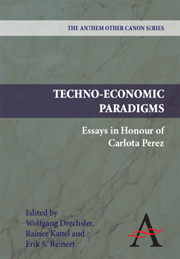Book contents
- Frontmatter
- Contents
- Preface
- Techno-Economic Paradigms
- 1 Introduction: Carlota Perez and Evolutionary Economics
- 2 Developing Innovation Capability: Meeting the Policy Challenge
- 3 Slow Food, Slow Growth … Slow ICT: The Vision of Ambient Intelligence
- 4 Technical Change and Structural Inequalities: Converging Approaches to Problems of Underdevelopment
- 5 The New Techno-Economic Paradigm and its Impact on Industrial Structure
- 6 Governance in and of Techno-Economic Paradigm Shifts: Considerations for and from the Nanotechnology Surge
- 7 Innovation Policy and Incentives Structure: Learning from the Mexican Case
- 8 Schumpeter's Business Cycles and Techno-Economic Paradigms
- 9 Asian Innovation Experiences and Latin American Visions: Exploiting Shifts in Techno-Economic Paradigms
- 10 Doing Capitalism: Notes on the Practice of Venture Capitalism (Revised and Extended)
- 11 Small States, Innovation and Techno-Economic Paradigms
- 12 Financial Experimentation, Technological Paradigm Revolutions and Financial Crises
- 13 Why the New Economy is a Learning Economy
- 14 The Art of Macro-Qualitative Modelling: An Exploration of Perez' Sequence Model of Great Surges
- 15 Technology, Institutions and Economic Development
- 16 Techno-Economic Paradigms and the Migration (Relocation) of Industries to the Peripheries
- 17 On the Discreet Charm of the (Rentier) Bourgeoisie: The Contradictory Nature of the Installation Period of a New Techno-Economic Paradigm
- 18 Production-Based Economic Theory and the Stages of Economic Development: From Tacitus to Carlota Perez
- 19 Carlota Perez' Contribution to the Research Programme in Public Management: Understanding and Managing the Process of Creative Destruction in Public Institutions and Organizations
- 20 Carlota Perez – Her Biography and the Origins of her Ideas
- Notes
- Bibliography Carlota Perez
17 - On the Discreet Charm of the (Rentier) Bourgeoisie: The Contradictory Nature of the Installation Period of a New Techno-Economic Paradigm
Published online by Cambridge University Press: 05 March 2012
- Frontmatter
- Contents
- Preface
- Techno-Economic Paradigms
- 1 Introduction: Carlota Perez and Evolutionary Economics
- 2 Developing Innovation Capability: Meeting the Policy Challenge
- 3 Slow Food, Slow Growth … Slow ICT: The Vision of Ambient Intelligence
- 4 Technical Change and Structural Inequalities: Converging Approaches to Problems of Underdevelopment
- 5 The New Techno-Economic Paradigm and its Impact on Industrial Structure
- 6 Governance in and of Techno-Economic Paradigm Shifts: Considerations for and from the Nanotechnology Surge
- 7 Innovation Policy and Incentives Structure: Learning from the Mexican Case
- 8 Schumpeter's Business Cycles and Techno-Economic Paradigms
- 9 Asian Innovation Experiences and Latin American Visions: Exploiting Shifts in Techno-Economic Paradigms
- 10 Doing Capitalism: Notes on the Practice of Venture Capitalism (Revised and Extended)
- 11 Small States, Innovation and Techno-Economic Paradigms
- 12 Financial Experimentation, Technological Paradigm Revolutions and Financial Crises
- 13 Why the New Economy is a Learning Economy
- 14 The Art of Macro-Qualitative Modelling: An Exploration of Perez' Sequence Model of Great Surges
- 15 Technology, Institutions and Economic Development
- 16 Techno-Economic Paradigms and the Migration (Relocation) of Industries to the Peripheries
- 17 On the Discreet Charm of the (Rentier) Bourgeoisie: The Contradictory Nature of the Installation Period of a New Techno-Economic Paradigm
- 18 Production-Based Economic Theory and the Stages of Economic Development: From Tacitus to Carlota Perez
- 19 Carlota Perez' Contribution to the Research Programme in Public Management: Understanding and Managing the Process of Creative Destruction in Public Institutions and Organizations
- 20 Carlota Perez – Her Biography and the Origins of her Ideas
- Notes
- Bibliography Carlota Perez
Summary
Introduction
This chapter analyses one of Carlota Perez' main insights regarding the contradictory nature of the ‘installation’ period of the current new technoeconomic paradigm, as well as the role of these contradictions in the genesis of the ongoing financial crisis. Basically, despite the enormous potential for increased productivity growth unleashed by the current technological revolution, productivity growth in industrialized countries (and in most of the developing world) has actually declined since the irruption of the new ‘Age of Information Technology and Telecommunications’ (for the case of the US, see Figure 17.18). In essence, the period of ‘installation’ not only creates all the conditions for unleashing economic progress, but also generates ‘tensions’ of an economic, social and political nature that can turn into formidable obstacles to economic growth.
Perez identifies three main ‘tensions’ that are bound to arise during the period of ‘installation’ of a technological revolution: the first is the tension between ‘the paper economy and the real economy’ (i.e., between financial capital and productive capital); the second is the tension between ‘the size and profile of effective demand and those of potential supply’ (i.e., the real-economy effects of increased inequality); and the third is the political tension between ‘the poorer poor and the richer rich’ (Perez 2005, 16–19).
The first ‘tension’ relates to the very essence of the technological bubble that characterizes the period of ‘installation’ (see Figure 17.15); according to Perez: ‘[this is] a process of asset inflation in which the stock market (paper) values decouple from the real value of the companies they represent.
- Type
- Chapter
- Information
- Techno-Economic ParadigmsEssays in Honour of Carlota Perez, pp. 307 - 332Publisher: Anthem PressPrint publication year: 2009



